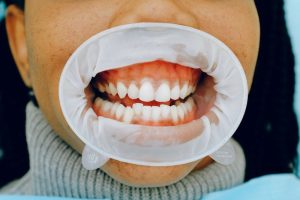Gum disease. Two words nobody wants to hear their dentist mutter out loud as he or she peers into their mouth.
Gum disease is actually pretty common in the U.S. About 46% of adults over 30 have some form of it, according to the CDC. The good news is, with your trusted Utah dentist by your side, it’s easy to prevent gum disease and treat it in the early stages. Knowledge is power, and prevention is vital, so read along to become educated on the early signs of dental disease. If these symptoms seem familiar, don’t hesitate to make a dental appointment with us.

(Anna Shvets/Pexels)
1. Red and Swollen Gums
Anything red, swollen, and painful on your body usually indicates a problem. The gums are no different. Healthy gums are not inflamed, puffy, or red. If yours are, there is probably a reason. Healthy gums are firm and pink in color, with no inflammation or redness. Inflamed, red, swollen, and painful gums signify gum infection. If you notice this, visit your dentist right away for treatment. If left untreated, your gums and jawbone will suffer. It’s not worth it.
2. Blood When Flossing
Bleeding gums are not happy gums. Blood, when flossing, doesn’t necessarily indicate that you’re flossing too hard. More times than not, it’s the first sign of gingivitis- aka the early stage of, you guessed it: gum disease. Gingivitis forms when there’s a buildup of plaque and tartar at the base of your teeth. The good news is that it’s early enough to fix it quickly at the dental office.
3. Severe Halitosis
Does your stomach turn at the smell of your own breath? Yikes! If you have bad breath that turns fresh after you brush, then that’s normal. But if you’re experiencing chronic bad breath, there may be something causing it, such as dry mouth or gum disease. Bacteria in the mouth that cause severe bad breath, can seriously harm your gums, and negatively impact your oral health. So, if your bad breath seems impossible to get rid of no matter how many times you brush and no matter how many mints you pop, it’s time to make that dentist appointment.
4. Sensitivity to Hot or Cold Substances
Dental sensitivity can be ever so irritating. If you get a chilling burst of pain in your teeth when you bite into an ice cream cone or sip your hot coffee, it may be a sign of tooth decay or receding and inflamed gum tissue leaving the root of your tooth exposed. When the root is exposed, it heightens sensitivity in the teeth. Sensitive teeth can be one of the most uncomfortable early signs of periodontal (gum) disease. Visit your dentist so you can enjoy that ice cream again.
5. Loose Teeth
If you have loose teeth, that should be a given that something is wrong. Loose teeth may signify that your gum disease is passing the “early” stages and progressing to the point of affecting your gum tissue and jawbone more seriously. If you notice loose teeth, seek treatment as soon as possible. Loose teeth from gum disease have been associated with health issues such as respiratory illnesses, heart disease, stroke, and more.
6. A Metallic Taste in the Mouth
Does your mouth taste as if you had a side of metal with breakfast, lunch, and dinner? Yuck! If you notice a metallic taste in your mouth, there’s a good chance that your gums are bleeding, and it’s the blood you are tasting. If you notice this taste frequently, your gums are more than likely infected and need immediate attention from your trusted dentist. There is hope to get rid of that metallic taste, we promise!
7. Elongated Teeth
If your teeth look more elongated than they used to, your gums may be receding. Receding gums means the gums are slowly falling away from the base of the teeth, exposing the root. Not only does this cause aesthetic problems, but it is a major warning sign of periodontal disease. Ask your dentist how to prevent further receding of your gums, and take care of this issue sooner rather than later.
If you’re experiencing any of the above symptoms, make an appointment with your dentist as soon as possible. Early intervention is key in preventing further damage to your teeth and gums. Even if you’re unsure if there’s a problem, make the appointment anyway. It’s better to be on the safe side regarding your oral health.
The best defense against gum disease is doing small and simple things such as brushing and flossing daily and showing up for your teeth cleanings every six months, where your dentist will also perform gum disease screenings. Contact us if you have concerns about your gums. As highly-trusted family dentists in Utah, we are here to aid you in taking the best possible care of your dental health.
